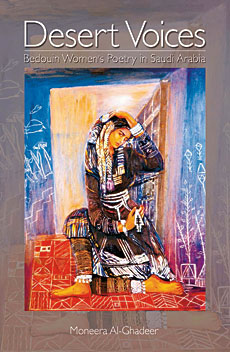Desert Voices tackles Bedouin women’s oral poetry, a little known subject. The author, Moneera Al-Ghadeer, has translated into English for the first time, some oral poems which were previously collected and published in 1969 by Abd Allah Ibn Raddas as “Shairat min Al-Badiyah.” An Arab poet himself, Raddas spent a decade in the 1950’s traveling across the Arabian desert collecting Bedouin women’s oral poetry. He admits that he only had access to a few samples because women’s oral poetry is often concealed and as a result, it is easily forgotten.
Moneera’s main purpose is to highlight the importance of Bedouin women’s oral poetry which has been largely ignored: “Modern Western and Arabic literary critics, unlike anthropologists, ethnographers and folklorists, have neglected both Bedouin poetry as a body of work and, more importantly, women’s contributions to this tradition,” she says.
Bedouin women’s oral poetry is known as Nabati poetry, a term referring to a poetic genre, composed in Bedouin dialects, reflecting the nomadic lifestyle. Nabati poetry also includes dialectical or vernacular poetry which is different from classical poetic forms written in classical Arabic.
Bedouin poetry is currently benefiting from renewed interest: Newspapers and magazines in the Arabian Peninsula offer weekly columns on Nabati poetry. Moreover, a number of Internet sites and blogs, as well as satellite TV programs, discuss Bedouin poetry. Moneera feels that this literary genre is used as “a cultural commodity... an object for consumption in a rapidly and alarmingly evolving consumer culture in the Gulf region.”
Translating Bedouin women’s poetry is not an easy task; the greatest difficulty is translating the untranslatable. The vocabulary is exceedingly rich and often has no equivalent in English. Women Bedouin poets have more than a hundred words to describe different types of camels and for pre-Islamic poets, the number of words exceeded one thousand. For example, the word ‘saniyah’ often translated, ‘water camel’, lacks precision because an English reader would not understand what ‘water camel’ means. Marcel Kurpershoek, a former Dutch diplomat posted in Riyadh in the mid-1990’s published “Oral Poetry and Narrative from Central Arabia: The Poetry of Ad-Dindan, A Bedouin Bard in Southern Najd.” He explains the classical Arabic word ‘saniyah’ as “a camel upon which a man rides while water is drawn from a well by a man riding or leading it away from the well, having the two extremities of a long rope tied to the saddle, and the upper end of the well-rope being tied to the middle of the former rope.”
Another interesting example of untranslatable terms concerns the camels’ colors; the Bedouin have a name for each shade. The word ‘zerka’ which literally means ‘blue’, refers in fact to a white camel with black hair. In English, describing a camel as blue seems utterly surreal.
Like their male counterparts, Bedouin women mention coffee in their poetry. In an anonymous and almost riddle-like poem, the author uses rhymes to vent her frustrations:
O my brother, springtime
Of exhausted travelers,
Leader of horses
Followed only by their dust,
I ask you about a man
With all the tools for making coffee,
Yet it’s been eight long years
And he hasn’t ground a bean!
He should either brew something in his pot
Like other men,
Or else yield the pot
To someone
Who cares for it.
Bedouin women poets are also inspired by love, desire, longing and most of all, by the desert environment. The elegy is a prevailing genre which has been used by Arab women since the pre-Islamic era. In fact women, such as the seventh century poetess, Al Khansa, are famous for their moving elegies. The following verses remind us of pre-Islamic odes. Here, the author conveys her grief by comparing the loss of her beloved with a female falcon distressed by the sight of its broken eggs:
My heart
A she-falcon
With broken eggs
Whose yolk has vanished:
Nothing left but the shell.
O my companion!
Hunter of the fleet gazelle
With long eyelashes,
This passion of his
Brought on each night.
By God! Were not the desert path
So rugged and impassable,
I’d jump like a heedless one
Startled by a slithering snake
Dreading its sharp-toothed sting.
This first presentation of Bedouin women’s oral poetry in English, leaves us hungry for more. Moneera has drowned these desert poems in a sea of academic verbiage. All sense of poetry is lost. The author regrets that oral poetry is unappreciated but her scholarly study is not really an invitation to savor the beauty of these awesome desert voices. Poetry like music speaks for itself. Too many erudite and cerebral explanations spoil the immeasurable pleasure of reading a poem, especially a poem on the desert. The desert since ancient times has been the ultimate refuge, boundless, untainted and stimulating. Bedouin women, despite their modern life with all its new technology, have never ceased to love the desert. Bakhu Al-Mariyah, in a moving elegy, expresses her longing for a tent and even the thought of a car blends into the desert environment.
My longing for a tent
After an adobe house.
My longing to see
Scattered herds of white camels.
My longing to accompany
A just-departed motor.
My longing to gaze
On the plain behind the mountain.
When Bedouin nomads
Disperse to desert camps,
The absent beloved
Will not be remembered.


